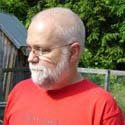Hey, it was good to see you at the Agway today. Just a couple of suburban homeboys trying to read Wittgenstein. I wanted to take up the idea of second languages & Wittgenstein's treatment of it in 32. Earlier in our discussions, in talking about language, I relied a good deal on my recent experiences trying to learn Vietnamese. My second language. How I learned my first language, I will of course never know. I would need to have had language to encode that experience; what I do know is that very early in my life I realized that language, even if it did not create the world, created to a large extent the human experience of the world. (I understood the power of effective lying.) I would go so far as to suggest that what we call mystical are those experiences that fall outside the ability of our language to express them. I'm following the Tractatus in this, I think. Those last few pages William Barrett sees as crucial to the movement of the Philosophical Investigations. (One of the infuriating things about Wittgenstein studies is the debate that frames Wittgenstein's career as either a smooth continuum from the Tractatus to the Investigations, over against the view that there is a radical break between the early & the late Wittgenstein. Both views are true, which is to say that neither is true.) Question: is the classical Logical Positivist view of language that a proposition can be A) true, B) false, & C) nonsensical? If I've got this right, doesn't W. even in the Tractatus suggest a fourth possibility: D) propositions that are neither true nor false, but to which we still attribute sense?
Anyway, back to second languages: At every step of the way in my learning Vietnamese I am "triangulating" between my native knowledge of English, Vietnamese, & some third ideal point--perhaps the Chomskian language-in-general. Except, that there were moments, living in Hanoi, when Vietnamese just simply happened to me. That is, I became a baby again & began to know the language from the inside. In those moments, I was reborn into Vietnamese. The experience always left me giddy. I would go so far as to say that, for a poet like me, supposedly superbly fluent in my native tongue, learning even so much Vietnamese as I have managed so far, represents a conversion experience. The fact is, during my year in Hanoi I was both deliriously happy & profoundly disoriented & manic. Obsessive. It was a crisis experience, life-changing. Had I gone as a tourist or diplomat with no intention of struggling with the language, I could have avoided this mental turmoil; which is to say, I could have avoided the experience itself.
Philosophical Investigations
Christopher Robinson & Joseph Duemer read Wittgenstein's Philosophical Investigations


0 Comments:
Post a Comment
<< Home